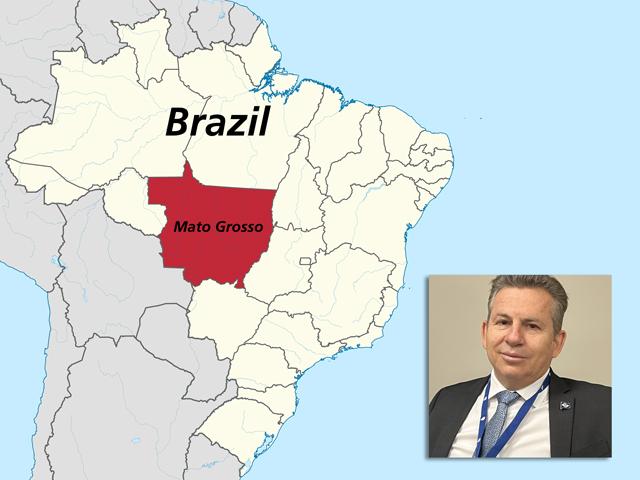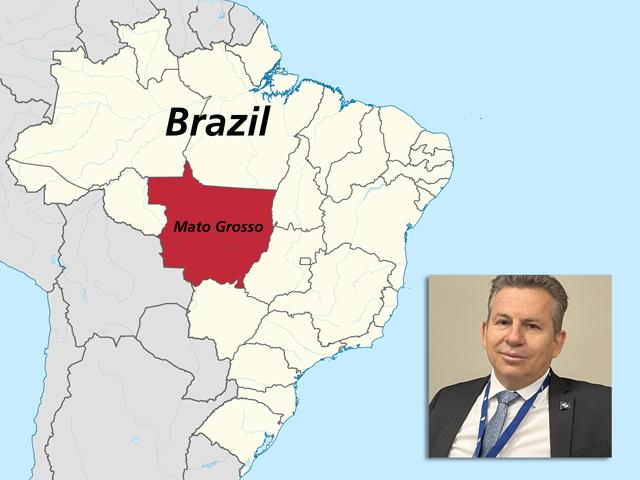South America Calling
Mato Grosso's Governor Touts Strategy to Expand Crop Production With Irrigation
LINCOLN, Neb. (DTN) -- The governor of Mato Grosso, Brazil's dominant agricultural state, wants to learn from Nebraska irrigation strategies and policies to expand irrigated agriculture in parts of Brazil.
Gov. Mauro Mendes Ferreira spoke Monday at the Water for Food conference hosted by the University of Nebraska. Officials in Nebraska had hosted Mendes and other Brazilian officials last year to begin opening a dialogue on irrigation development in Brazil.
Mendes also spoke to DTN about infrastructure, irrigation and Chinese investments in Brazilian agriculture.
Mendes also met Monday morning with Nebraska Gov. Jim Pillen, and the two talked about similarities between the two states and some areas where they could work together. Talking about the two states, Mendes said, "Nebraska and Mato Gross have many things in common. Both are in the center of their countries and both are important food-producing states."
Mendes's speech and interview were interpreted by Christopher Neale, director of research for the Daugherty Water for Food Global Institute at the university, which has spearheaded conferences centered around irrigation development.
Mato Grosso is responsible for $21.6 billion in agricultural exports and produces more soybeans on its own than Argentina, the world's third-largest producer. Still, Mendes pointed out that the state has 29.6 million acres of production (12 million hectares) but only has 422,000 irrigated acres, less than 1.5% total.
Irrigation has the potential to allow some farmers to grow not only two crops but three crops in a single year, Mendes told DTN.
"With irrigation, they'll guarantee the production; they'll be able to start planting soybeans earlier," Mendes said through Neale. "That means they can fit (in) a full corn crop instead of a short-season corn. Plus, they'll grow dry beans in the third season. So, that's if they can do it sustainably. That's the goal."
Mendes also highlighted that 62% of Mato Grosso is still in preserved areas of the three main ecosystems: the Amazon, the Cerrado or savannas, and Pantanal wetlands. In his speech, Mendes cited that the entirety of preserved land in Mato Grosso is larger than the country of France. Speaking to DTN, both Mendes and Neal noted the country faces global pressure to preserve ground from expanded agricultural production.
"The reason we are helping them (Mato Gross) as an institute together with other partners in Brazil, is they understand that if we introduce irrigation sustainably in the existing areas of agriculture, that would take (away) the pressure to cut down more forests, or cut down more savannah, and increase the productivity on existing lands," Neale said. "So, that's the rationale if they can do it sustainably, and that's why we're going to help them analyze the groundwater and the surface waters model and see what's available."
IRRIGATION INTENSIFICATION
Pointing specifically to the Amazon biome and its importance in sucking carbon out of the atmosphere, Mendes said, "There is a need and a will to maintain sustainability."
Yet, despite its productivity as a state, Mendes also said production per hectare is still lower than in the U.S. Agriculture as a whole in Brazil is now linking the need to protect the Amazon with the need to increase productivity through irrigation.
P[L1] D[0x0] M[300x250] OOP[F] ADUNIT[] T[]
"So, we want to increase the production, but we want to protect the ecosystem and biome, mainly the Amazon region," he said.
With that, Brazil sees the need to intensify production on existing land, and irrigation is a key area for development there.
"They view irrigation and all of the experience we've had managing water as fundamental in helping them move ahead in this area," Neale said.
Mendes said preliminary studies indicate Brazil overall could convert 25.7 million acres (10.4 million hectares) to irrigation, including roughly 9.6 million acres (3.9 million hectares) in Mato Grosso.
"There is a need to study the resources, including the groundwater aquifers in the region to determine the availability," Mendes said. He added, "The goal is to tap into this production and see what is available and use that to sustainably increase production."
While Brazil has 20% of the world's freshwater supplies, a large share of that is tied to the river systems in the Amazon region. Mendes said agricultural irrigation will use groundwater wherever possible, but groundwater systems need to be studied further.
"So, we hope to increase the production of food while preserving the environment. That's the big challenge," Mendes said.
Part of the drive for irrigation is also tied to a push for Brazil to meet its climate-emission goals by 2035 -- 15 years ahead of schedule, Mendes said.
"That's why irrigation is going to play an important role in meeting the food challenge. They are going to intensify and take the pressure off the country's ecosystems," Neale said, interpreting Mendes.
Mendes added that Mato Grosso is looking for partnerships going forward. "This (Nebraska) is a state which has accomplished a lot in these areas of agricultural irrigation technology while preserving water resources, and they (Mato Grosso) want to do the same," Neale said, interpreting Mendes.
Marcos Heil Costa, a professor at the Federal University of Vicosa in Brazil, looking at Brazil's irrigation potential, said it is needed to increase the production of the second, or safrinha crop. While Mato Grosso has a long rainy season, those rains generally decline when the soybeans are harvested and the safrinha crop, typically corn, is planted. That's where irrigation will enhance production and possibly lead at least some producers to consider a third crop as well.
Looking at limitations, Costa said knowing the full prospects of aquifers is needed. A significant increase in electrical power also is needed in rural areas of Mato Grosso to generate electricity for irrigation systems, he said. Then, there are the traditional issues such as availability of credit and interest rates for producers trying to develop irrigation projects. Brazil and states such as Mato Grosso also would have to develop far more extensive monitoring networks for irrigation use.
"I believe we need a new paradigm for water monitoring in Brazil," Costa said.
HIGHWAY MESS
While looking at irrigation investment, Brazil still struggles with its roadway investments. One of those involves BR-163, a federal highway meant to connect Mato Grosso's agricultural production. Originally slated to be completed in 2019, a private company had been given the contract or "concession" to develop the highway in return for the tolls generated from it. Mendes said that plan fell through. The expansion of the highway was put on hold after financial issues hit the company that won the concession, so they did not finish the work.
Other companies looked into buying the failed contractor and completing BR-163, but after four years of trying, "They didn't think it was viable economically," Mendes said through an interpreter.
The toll was equivalent to $1 per 100 kilometers, but that did not generate enough return to make it a viable investment.
"Last week, the government of Mato Grosso assumed the project, and they are the ones who are going to complete it and do the concession," Mendes said through the interpreter.
The state government will now be the concessionaire to the federal government to complete the highway, which is projected to cost more than $1.3 billion. It will take up to five years to complete. The Mato Grosso government will then establish new tolls for the highway.
"Then, later, they will negotiate with the federal government," Neal said for Mendes.
About half of Mato Grosso's grain and oilseed exports use the northern half of BR-163, and a sizable share also uses the southern half of the highway.
MENDES: CHINA BUYING BUT NOT INVESTING IN MATO GROSSO
While Chinese investment has flooded Brazil and Chinese state-owned companies such as COFCO have ownership interests in Brazilian agribusinesses, Mendes said China right now is not a big player in Mato Grosso itself.
"There are no Chinese investments in Mato Grosso right now. Most of the investments in infrastructure are from the government, state government and from private companies -- like private companies' investment in 700 kilometers of railroads," Mendes said through Neale.
Asked further about Chinese purchases of companies with a large chunk of soybean and beef products going to China, Mendes added through Neale, "So, the Chinese are big buyers right now and have a huge market, in his opinion. China is good and bad for humanity -- both ways, right?"
Chris Clayton can be reached at Chris.Clayton@dtn.com
Follow him on Twitter @ChrisClaytonDTN
(c) Copyright 2023 DTN, LLC. All rights reserved.






Comments
To comment, please Log In or Join our Community .